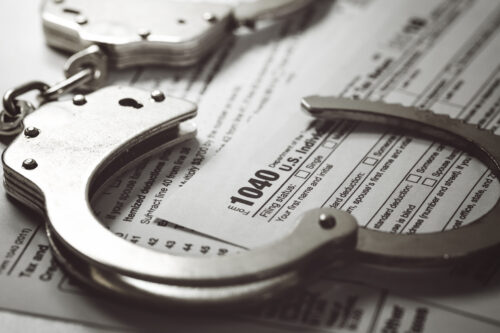
If you fail to pay your state or federal taxes in New York, you will be charged with tax evasion. Tax evasion may be committed in several acts, such as failing to file a tax return or falsifying information on a return. Tax evasion carries harsh penalties in New York regardless of the specific circumstances. However, sometimes individuals are wrongly accused as they made an unintentional error or followed unsound advice regarding their tax obligations. Whatever the case, if you are currently facing tax evasion charges, contact our determined Nassau County Criminal Defense Attorneys, who can help you avoid harsh penalties. Please continue reading to learn about the potential penalties you may face for this crime.
What is tax evasion in New York?
Tax evasion occurs when an individual legally required to make mandatory contributions to the local, state, and national government to cover the costs of general government services fails or intentionally does not pay their tax liabilities. Therefore, if you deliberately avoid or underpay your taxes, you will be charged with tax evasion. However, the government has the burden of proving the following:
- You attempted to evade or defeat a tax or the payment of a tax
- You took intentional actions to avoid paying your taxes
- You willingly avoided paying your taxes despite knowing your tax liabilities.
The state and federal governments can bring charges against private individuals and businesses. The most common forms of tax evasion include underreporting income, exaggerating tax deductions, and transferring or hiding assets to avoid paying the amount you owe to the government.
What are the potential consequences?
Tax evasion is a serious crime in New York that carries significant penalties. This is a serious offense as it involves deceiving the government by not fulfilling your tax responsibilities. Therefore, your sentence’s severity will vary depending on the amount you failed to pay and whether you are being prosecuted by the state or federal government. It is critical to note that you will be subject to harsher penalties if the federal government charges you. Nevertheless, in New York, tax evasion may be classified between a class A misdemeanor and a class B felony depending on the circumstances of your offense.
The lowest level of tax evasion is classified as a fifth-degree class A misdemeanor punishable by up to one year in jail. If you intentionally avoided paying over $3,000, you will be charged a fourth-degree class E felony. If you fail to pay over $10,000 of your tax liability, you will be charged with a third-degree class D felony. If you withhold over $50,000, it will be classified as a second-degree class C felony. Finally, if you are charged for an amount over $1,000,000, it is classified as a first-degree class B felony. The most severe penalties you will face are those of a class B felony which is punishable by up to 25 years in jail.
With such harsh penalties at stake, it is in your best interest to retain the legal services of a qualified attorney from the legal team at Grunwald & Seman, P.C., as soon as possible. Our firm is committed to vigorously fighting the charges brought against you to help you seek the best possible outcome.
